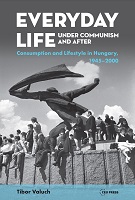Everyday Life under Communism and After
Lifestyle and Consumption in Hungary, 1945–2000
Author(s)
Valuch, Tibor
Collection
Knowledge Unlatched (KU)Language
EnglishAbstract
By providing a survey of consumption and lifestyle in Hungary during the second half of the twentieth century, this book shows how common people lived during and after tumultuous regime changes. After an introduction covering the late 1930s, the study centers on the communist era, and goes on to describe changes in the post-communist period with its legacy of state socialism.
Tibor Valuch poses a series of questions. Who could be called rich or poor and how did they live in the various periods? How did living, furnishings, clothing, income, and consumption mirror the structure of the society and its transformations? How could people accommodate their lifestyles to the political and social system? How specific to the regime was consumption after the communist takeover, and how did consumption habits change after the demise of state socialism? The answers, based on micro-histories, statistical data, population censuses and surveys help to understand the complexities of daily life, not only in Hungary, but also in other communist regimes in east-central Europe, with insights on their antecedents and afterlives.
Keywords
Financial Circumstances; Prices; Wages; Eating; Fashion; Housing ConditionsDOI
10.7829/9789633863770ISBN
9789633863763, 9789633863770Publisher
Central European University PressPublisher website
http://ceupress.com/Publication date and place
Budapest, 2021Classification
Social and cultural history
History and Archaeology
Later 20th century c 1950 to c 1999


 Download
Download